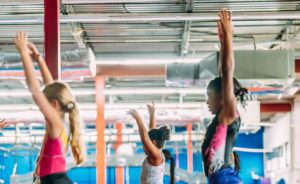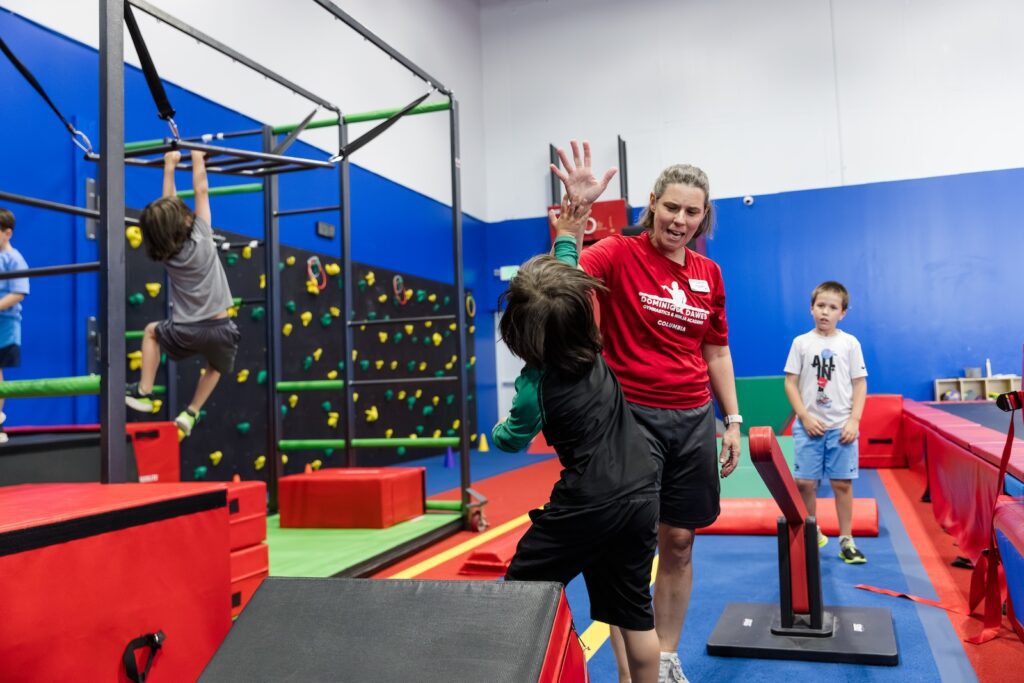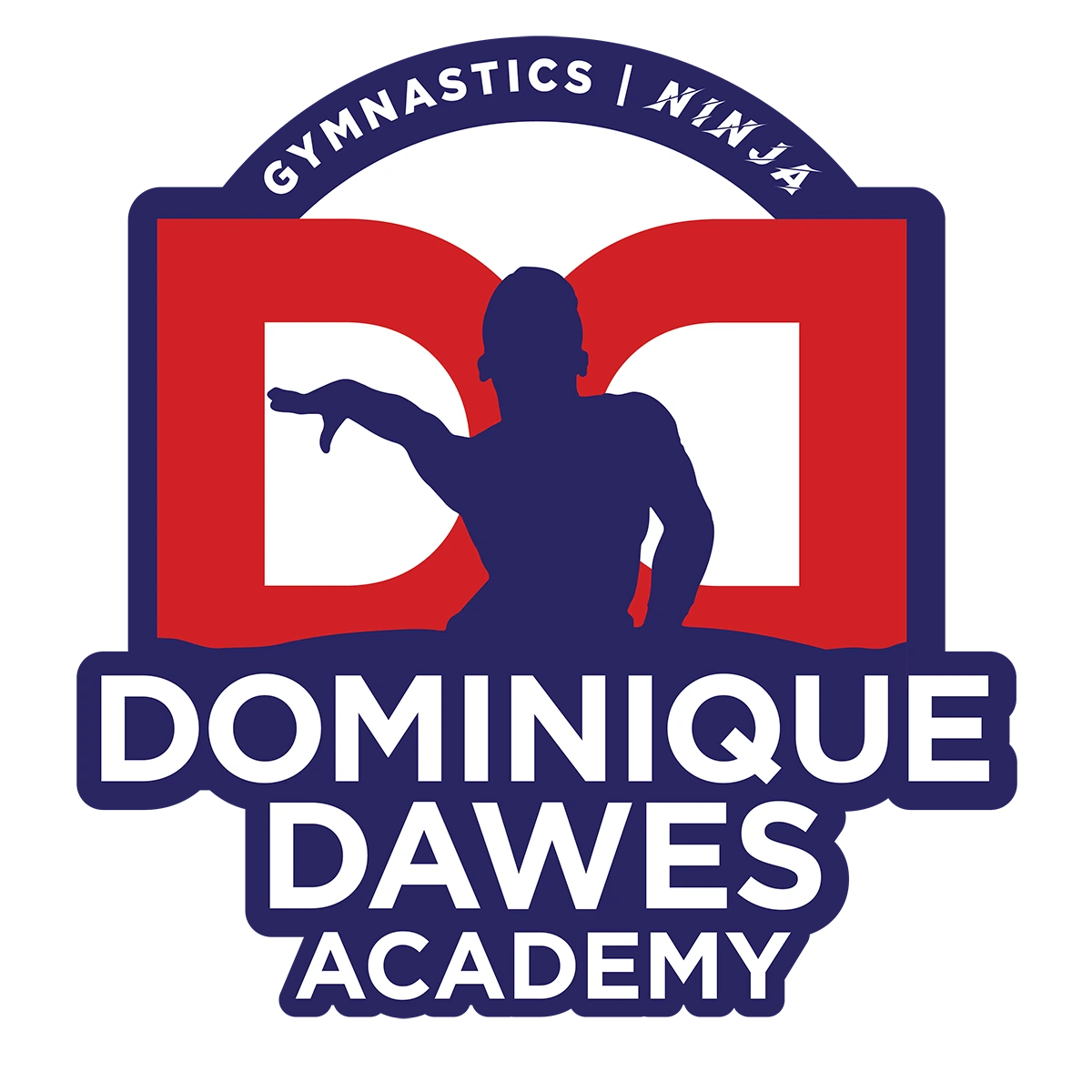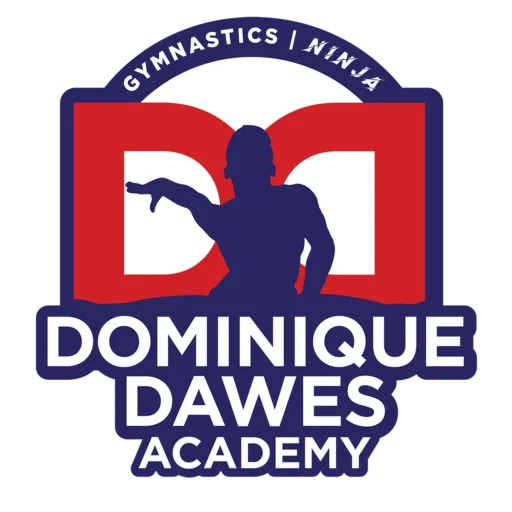
I can still see him. At about three years old, my oldest was scaling the outside of our spiral staircase. I was probably doing the screaming-hearts-in-my-chest thing, but if I’m being honest, I was also watching with a little child-development-expert pride. It wasn’t just climbing. He was problem-solving, working out his own strength, and seeking out physical challenge.
You know that kid. The one with couch-cushion-forts that serve as launching pads. The “don’t spin in the kitchen!” twirls that defy dizziness. The endless, boundless, sometimes terrifying energy of a young child. As parents and (experts) we have one question, repeated over and over: Where do I channel this?
And for so many of us, the answer is gymnastics.
Gymnastics is what’s known in the gymnastics world as a “foundation” or “mother” sport. It’s gymnastics first. Everything else second. It’s the sport that teaches body awareness, coordination, strength, and flexibility. The skills for everything that follows. The tools they’ll use to be the best they can be at soccer or dance or just being a confident kid on the playground.
But like any first foray into a big, new world, starting gymnastics can feel a bit overwhelming. Iconic as it is, it’s still a huge leap. After all, what will my 3-year-old actually be doing? Will it be safe? Is it going to be too hard? (Insert parental worrying here.)
As a team of child development professionals and coaches who have been working with families for decades, we want to pull back the curtain. Here’s the inside scoop. Let us walk you through exactly what to expect, starting with:

The Real Youth Gymnastics Expectations
This one is for you, mom and dad. For the one on the sidelines wondering how in the world you can support your child’s first tumble. For the one doing internet research so you can go into class day one with confidence.
Let’s take a look at the real youth gymnastics expectations, and go inside what it really looks like to start gymnastics in Alpharetta. Before that first class, let’s have a quick look at what’s happening under the hood. To their brain, to their body.
When your child walks (or runs) into a gymnastics gym, it’s more than just a place to burn energy. It’s one of the most multi-sensory, mentally engaging spaces possible.
Think about it. Rolling down a wedge mat (affectionately called a “cheese mat” in the gym) is rolling through vestibular stimulation. Tapping into the internal sense of balance that tells us where our body is in space. Hanging from the “monkey bars”? Developing the grip strength and shoulder stability needed to later hold a pencil and sit upright in a desk chair.
Every jump, every balance, every spin is wiring new neural pathways in the brain. We’ve seen time and again how the sequencing of gymnastics skills (first you run, then you hurdle, then you jump) supports cognitive learning like reading and math.
You’re probably signing up for an energy outlet. But what you’re also giving them (literally from the ground up) is a cognitive, social, and physical head start.
Brain stuff aside, let’s get into what that looks like at every age.
Age-Appropriate Expectations: From Toddlers to Competitive Athletes
A 2-year-old is going to be in a completely different place developmentally than a 7-year-old, and they should have a completely different experience.
The “Parent & Tot” Adventure (Ages 2-3)
You are their world and their translator for the world, so this class is a “we” activity.
What to Expect: Picture a guided play session. Literally. The coach’s job is to set up a playful, exploratory, problem-solving environment and guide you through it. A “Parent & Tot” class usually means you and your child will navigate together through colorful, tiny obstacle courses. You’ll sing songs (hello “Head, Shoulders, Knees, and Toes” on a low balance beam) and learn basic social skills like taking turns and following the coach.
The Skills: Don’t expect cartwheels yet. Skills at this age look more like “walking with flamingo feet” (one foot in front of the other) on a line, “log rolling” down a wedge mat, or “kangaroo jumping” on a small trampoline into a giant, soft mat…with your help.
The Goal: It’s all about positive exposure. And association. Of movement with joy. With you. Building that relationship with you in a new, active way.
The “First Solo” Preschool Years (Ages 3-5)
It’s the big milestone! This is often the first time a kid will experience a structured class with you watching from the viewing area.
What to Expect: For the first time, you’ll see your child be independent in a class setting. This is all about learning the shape of a class, and what it means to be a gymnast. We’re talking lining up (it’s called a “train”) and listening to a coach (not just mom or dad). How to take turns and wait your turn on the trampoline. This is also where we use vivid imagery and fun themes to teach the foundational shapes that they’ll carry with them through gymnastics: “tuck” (curling up into a tiny ball), “pike” (straight legs “smelling your stinky toes”), and “straddle” (a big “V” shape).
The Skills: Looks familiar, but the toddler coordination exercises are starting to take more of a gymnastics shape. Forward rolls (“rodeo rolls”), donkey kicks (the first step to handstand), cat-style walking on a medium-height beam. Hanging from the bar to work those arms and trying to lift those knees (“monkey swings”)
The Goal: Is independence. Listening skills. Body control. But not at the expense of a smile or participation. Success is not skill acquisition at this stage, it’s a child who tries and leaves class happy.
The School-Age Spark (Ages 6-8)
This is where the magic really starts. These are the ages where they have the body control, listening skills, and strength to start learning real gymnastics skills.
What to Expect: The class becomes more structured (less “theme” play, though still super fun). Your child will see themselves move through “stations” for vault, bars, beam, and floor work. They’ll get more time on each “event,” doing specific drills.
The Skills: Is where that cartwheel will finally start to happen. Handstand hold against the wall, a proper “bridge” with straight arms, and a “pullover” on the bars (pulling your body up and around the bar). They are gaining real, measurable strength and flexibility.
The Goal: Skill acquisition. And building self-esteem. This is the age when they start to see themselves improve and that the sky is the limit. I can’t flip turns into I did it flips — and that feeling is transformative.
The Path to Progression: From Recreational to Competitive
For some kids, gymnastics will light a fire. They will love it and have an aptitude for the sport. So then what? The progression question is one of the most common we hear, and we wanted to be crystal clear about our process.
At Dominique Dawes Gymnastics and Ninja Academy, progression is a clear, invite-only, collaborative process between the coach, the parent, and the child. Hard, fast rules like “ages and levels” never tell the full story. Progression is never about pressure.
We have developmental tracks (“pre-team”) that gently increase the time and focus, to help kids refine their form and build the strength needed for the skills they love to try.
This is the route that a child can take toward a competitive track, but it’s just one of many. We also have many gymnasts who stay in our recreational classes for years. They simply love the challenge, and it’s giving them a fantastic foundation of fitness for life.
And for those super busy Alpharetta families out there, we get it. Soccer season starts, that big school project comes home. This is why we designed our academy with flexibility as a priority. Month-to-month plans, not year-long commitments with pen
The Dominique Dawes Academy Difference: Olympic-Inspired Training Philosophy
Your hear the words “Olympics” and “Dominique Dawes” and let’s be real: that can sound… A little intimidating. We hear you. But it’s the opposite of our culture, our ethos. Our Olympic-inspired philosophy is based directly on the lessons of Dominique’s own life journey.
It’s not about the medal. It’s about the resilience and confidence and character she built along the way.
Our entire academy mission is “Beyond Gold Medals.” We’re not just training gymnasts, we are building happy, healthy, and confident kids.
Confidence First, Skills Second
This is our belief system. This is what guides everything. What does it mean?
It means we believe a child who believes they can try, is more successful than a child who is terrified of failing, but can do a skill. We celebrate the try. We cheer for the child who falls off the beam and gets back on. We break scary skills into 20 tiny, safe pieces so the child can build that ladder of success.
This positive, empowering environment is what sets our academy apart. We are building a child’s “I can” muscle first. The skills will follow.
Our State-of-the-Art Facility: Designed for Safety and Success
This “confidence first” philosophy is built into our very gym. When you step into our new North Atlanta location, you’ll see the obvious: top-of-the-line, Olympic-grade equipment. But look closer.
The equipment is sized for little people. We’ll have low beams, single rail bars, just off the floor, and reams (literally) of soft colorful panel mats. In-ground trampolines and “tumble tracks” (those long bouncy runways) that dump into gigantic foam pits.
Every single piece is chosen to do one thing: to allow a child to explore and challenge their body in the safest way possible. You’ll notice our safety protocols are based on Olympic-level equipment and coaching protocols thoughtfully reimagined for children.
It’s our home that we built for your child.
Supporting Your Young Gymnast: A Parent's Role in the Journey
Ok, parents. Your child is signed up. You have the new leotard, and now you’re in the viewing area. Your role in this process is no less important than the coach’s. But it might be different from what you think.
Asking the Right Questions
Here’s the thing. Your child is in class. They’re there and they’re safe. They are yours. You are them. For a few glorious hours.
When they come out, sweaty and smiling, you want to know. You’re going to ask the million-dollar question.
But what if we could help you ask better ones?
Oh, we hear you. “Did you do your cartwheel?” “Were you the best?” We gently coach families to a different set of questions. Questions that don’t focus on the outcome (the skill), or the comparison (the “best”).
Try these:
- “What was the most fun thing you did today?”
- “Did you try something that felt a little tricky or brave?”
- “What’s one new thing your body learned how to do?”
- “Did your coach “catch” you doing something awesome?”
These questions reinforce the message of confidence first. The big message you are sending your child is that you value their effort and their joy over everything else.
And hey, of course talk about how it felt to get a new skill! This is that confidence-first approach in action. Skills are a process for a child, and the more they learn that it’s all about trying, the more success they’ll have with the harder things.
The Big Three Parent Concerns: Cost, Time, and Pressure
OK, let’s be open. These are the three biggest things we know you worry about.
Cost: Right. The thing is, we believe in the same thing. Transparent, upfront pricing. If you’re going to invest in your child’s total development, we respect that and honor it.
Time Commitment: Again, with our recreational classes — which is where the majority of our children stay, even when they progress — we’re talking about 1 or maybe 2 hours a week. Total. Power-packed, high impact development that slots into a balanced schedule with plenty of time for soccer or art or just plain old climbing trees.
Competitive Pressure: This is the big one. We promise you we are always going to put the long-term mental and physical health of your child first. Pressure comes from an environment that puts the podium before the person. We put the person first.
Our competitive options are that: an option. If it’s what’s right for your child, it’s what we offer. If it’s not, that’s what we offer. And even on our competitive team, the “Beyond Gold Medals” philosophy is the law of the land.
The Power of a Local, Family-Friendly Educational Partner
We want to do more than teach your kids gymnastics in Alpharetta. We’re in this to be part of your village. We chose this location with family in mind.
You have a dozen things you’re juggling. We’ve got you covered with easy access off major roads with plenty of safe parking so you don’t have to juggle even more. We’re close to the places you already go, too (grocery store, the coffee shop). It’s no accident.
When we say community, we mean it. You’ll see those faces from school, have dinner with other parents from the viewing area, watch the friendships form. This is the family-friendly, supportive culture we’ve worked years to build in our Maryland and Virginia families, and it’s the heart and soul of our new Alpharetta location.
Choosing a home for your kids’ gymnastics classes in North Atlanta can feel overwhelming. Our best advice is that you find a program that matches your family values. A place that prizes your child’s confidence. Celebrates their effort. Knows that the lessons they learn on the mat are the ones they take with them for life.
If you’re looking for a structured and supportive environment where your child can develop their athletic skills and build that confidence we’ve been talking about, check out Dominique Dawes Gymnastics Academy.
Your Child’s Gymnastics Journey Begins Here | Dominique Dawes Academy
Success in gymnastics: What is it? It’s not that first-place trophy.
It’s the shy 4-year-old who, after three weeks, lets go of your leg and runs to join the class.
It’s the hyper 6-year-old who learns the focus and discipline to sit and wait his turn.
It’s that 8-year-old who works for six solid months to get her pullover on the bars and then, finally, finally, lifts herself up there, all by herself.
The look on her face when she does it: That’s it. That’s the “gold medal.” It’s the feeling of “I can do hard things” she’ll take into her classroom, the playing field, and her whole life.
We hear it all the time, from our parents and gymnasts. One mom told us her daughter’s teacher asked what they were doing because her confidence in reading class had skyrocketed. It was the gymnastics, she replied — knowing she was strong.
Our programs are designed to offer expert coaching rooted in positive child development. Age-appropriate activities that are always fun and engaging. And a core focus on building a love of movement that can last a lifetime.
Reach out and learn more. Let’s start this amazing journey together.



